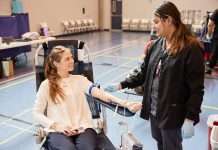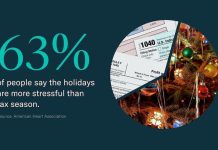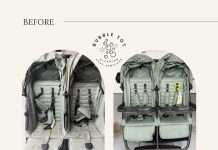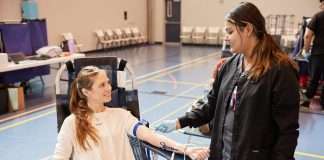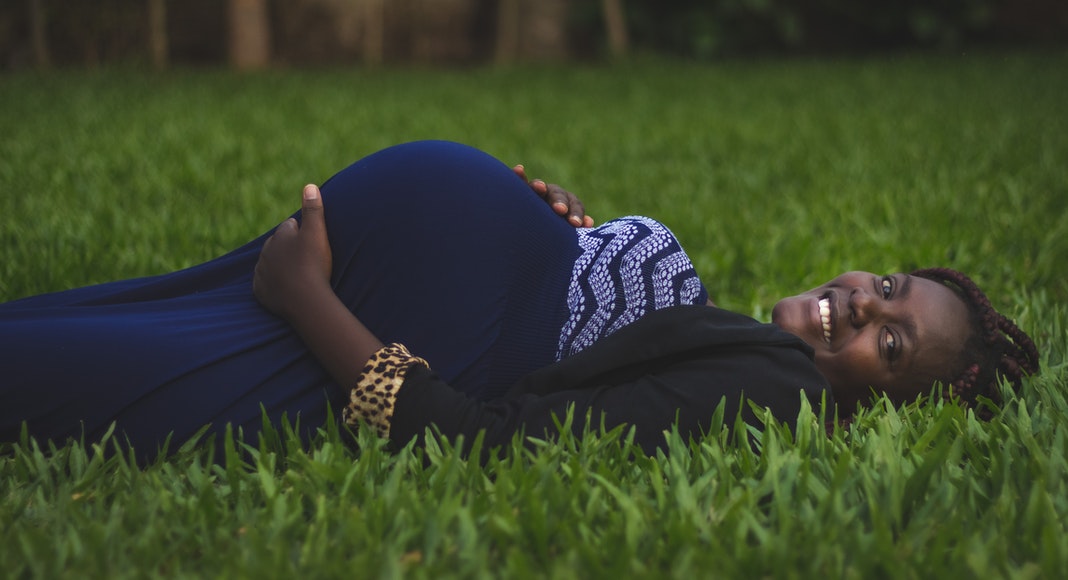 San Francisco Bay Area Moms recently interviewed Michelle Henning, a certified Nutrition & Health Coach, writer, and graduate of the Irish Institute of Nutrition & Health. Her articles on food, nutrition, parenting and health have been featured in WIRED Magazine, Pathways to Family Wellness, BabyCenter, and many other outlets. Her newest book is Grow Healthy Babies: The Evidence-Based Guide to a Healthy Pregnancy and Reducing Your Child’s Risk of Asthma, Eczema, and Allergies.
San Francisco Bay Area Moms recently interviewed Michelle Henning, a certified Nutrition & Health Coach, writer, and graduate of the Irish Institute of Nutrition & Health. Her articles on food, nutrition, parenting and health have been featured in WIRED Magazine, Pathways to Family Wellness, BabyCenter, and many other outlets. Her newest book is Grow Healthy Babies: The Evidence-Based Guide to a Healthy Pregnancy and Reducing Your Child’s Risk of Asthma, Eczema, and Allergies.
As a pregnant mom, what can I do to reduce the risk of allergies, asthma and eczema for my baby?
It mostly comes down to one thing: Minding your microbiome – that is, the friendly bacteria in your gut! Your microbiome is passed on to your child via birth and breastfeeding and then plays a crucial role in programming your baby’s immune system. So what do you do to take care of your gut bacteria? As we say in the book, “your diet is the steering wheel for your microbiome”. The foods you eat determine what type of bacteria thrive in your gut, and the friendly ones you want are fed by a diet rich in plants, anti-oxidants, and healthy fats like olive oil, avocado, and fish. The easiest and yummiest way to achieve this is to follow a Mediterranean style diet! You can also boost your microbiome with fermented foods and drinks, as well as prebiotic and probiotic supplements and certain vitamins like vitamin D.
Next, you want to ensure that you don’t harm your microbiome unnecessarily. The key is to avoid antibiotics unless they are really, truly necessary! In the book, we discuss when and why antibiotics tend to be prescribed during pregnancy and early childhood, what alternatives you might safely be able to try first (in discussion with your doctor, of course), and how to recover your microbiome if you do need to take a course of antibiotics.
Another big one is to breastfeed for as long as you can. Breast milk is rich in beneficial bacteria that help establish your baby’s microbiome. And did you know that breastfeeding basically lets you share your immune system with your baby? Your boobs are serving as an on-call defense mechanism: When your baby is fighting a bug, your body detects it via an immune system inside the breast and starts producing antibodies which are sent to your baby via the breast milk. It’s amazing!
Of course, there are many other things that you can do to reduce your baby’s risk of chronic diseases but these are the main ones I’d focus on. I sometimes joke that the tagline of the book could have been: “Boob, beans, bacteria”! The key is to start somewhere and not get overwhelmed. Just do what you can; every little bit you can do that nudges you towards better health is worth it!
As I prepare to give birth and while I am in the hospital, what can I do?
The one thing that helped me most was hearing honest and positive birth stories from friends who had given natural, vaginal births. They didn’t glorify the experience. Some women will perceive birthing as profoundly meaningful, even beautiful, despite the pain. But many won’t, and that’s okay. My friends all told me that giving birth was the most painful thing they had ever endured, at least until the painkillers kicked in. But they all managed to push through. It was difficult but possible if you focused. And they told me that if they could do it, so could I. So that was how I approached it: going into birth filled with hope and positive thoughts. As the labor progressed and got more painful, that’s what I held on to. I reminded myself that the calmer I stayed, the less painful it would be, and the faster and easier my baby would find her way out. I also told myself that – as a friend had put it – my baby was the one who had to do all the work, wriggling her way through the birth canal. I just had to relax and be her guide.
I also made a birth plan and kept copies ready in my hospital bag to give to the obstetricians and midwives. Putting my wishes down on paper, including what to do if things didn’t go to plan, calmed me down enormously. I felt much better prepared knowing that I had thought about and made all the important decisions in advance. Both my birth story and my birth plan are in Chapter 10 of the book.
What are environmental changes I should make in my home before I bring baby home? How soon should I start the process?
The sooner you start making certain changes, the better. These will also benefit your own health, and they could save you money!
I would focus on finding healthier alternatives for cleaning products and cosmetics – especially things that are heavily scented or can be sprayed. Spray cleaners and “air fresheners” are the worst for causing indoor air pollution that irritates your lungs and causes airway inflammation. Products that are heavily scented almost always contain hormone-disrupting phthalates that have been found to cause allergies, asthma, and worse.
Most supermarkets and drugstores now stock a range of “natural” cleaning products, cosmetics, and baby care items. As a rule of thumb, choosing those products over the “regular” ones should be an improvement for your and your baby’s health. You could also shop more from dedicated organic/eco-supermarkets, grocery stores, and health shops – these usually apply higher standards to the products they carry, so you are less likely to encounter greenwashed items. We have a list at https://www.growhealthybabies.
Lastly, you’d be surprised at how many cleaning and personal care products you can make at home using super-cheap, non-toxic, everyday ingredients. With a bit of googling, you can find simple recipes for homemade cleaners, body lotions and scrubs, or hair styling products. I forced my husband to swap his hairspray for a homemade beeswax + coconut oil putty. He actually loves it: It works better, smells better, and is much cheaper.
While breastfeeding, what things should I consider to help reduce allergies, asthma and eczema for my baby?
Breastfeeding itself is the main thing! In fact, based on hundreds of studies, breastfeeding is one of the best gifts you can give to your child for their long-term health and development. It helps babies’ sensory and cognitive development, protects them against infectious and chronic diseases, and reduces their risk of dying due to common childhood illnesses.
Breast milk is a wonder, finely tuned over millions of years of evolution. It contains an optimal and complete mix of nutrients which is highly tailored to the needs of the individual child – for example, breast milk for baby boys has more fat and protein, while breast milk for baby girls has more calcium. Also, breast milk is literally a “living” fluid. It contains over 700 different strains of beneficial bacteria and the prebiotic fibres needed to feed them. The composition of these beneficial bacteria changes over the first six months of breastfeeding, which suggests that different kinds of microbes might be important for the baby’s health at different stages of development.
Having said that: Perhaps your job makes it impossible to breastfeed, or there are medical reasons that prevent you from doing so. Our book discusses how you can nonetheless make formula choices that boost your baby’s chances of good health. For example, make sure to select formula that contains both the fatty acids DHA and ARA, which are vitally important to your baby’s brain development. I would also recommend buying formula that contains both probiotics and prebiotic fibre – or you can mix some into the formula yourself. Last but not least, choose an organic formula if possible and pay attention to the amount of added sugar – the less sugar, the better!
What should my partner do? Or my other children?
Get out of the house and give you a break! *laughs* Or perhaps your partner could read up on pregnancy health – and help you plan and prepare any health-related lifestyles changes you want to make, whether it’s meal planning, cooking, tossing out unhealthy cleaning products and cosmetics, or just giving you a nice, long foot rub. I spent nearly my entire first trimester zonked out on the couch and feeling nauseous, and my husband made me fresh ginger juices to help me feel better.
As for your other children: I think they should just get to share in the joy and anticipation of pregnancy as much as possible!
The information on this website is not intended or implied to be a substitute for professional medical advice, diagnosis, or treatment. All content, including text, graphics, images, and information, contained on or available through this website is for general information purposes only. Always seek the advice of your physician or other qualified health care provider with any questions you may have regarding a medical condition or treatment and before undertaking a new health care regimen. Never disregard professional medical advice or delay in seeking it because of something you have read on this website.
As an Amazon Associate, we earn from qualifying purchases.

